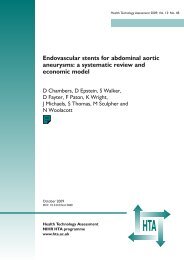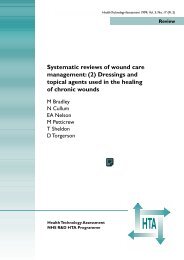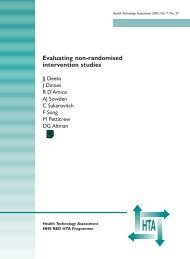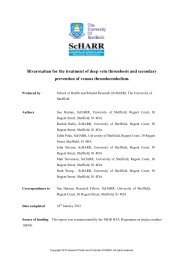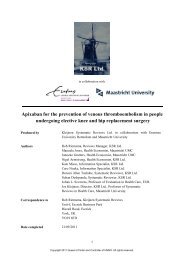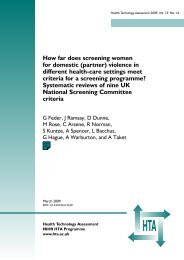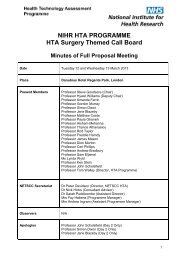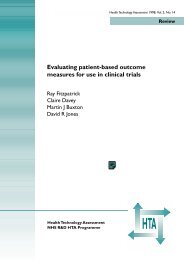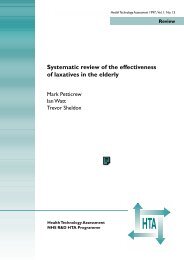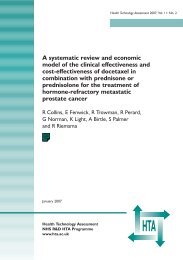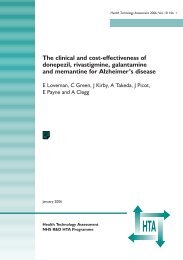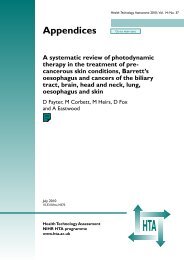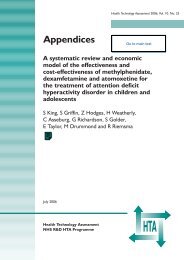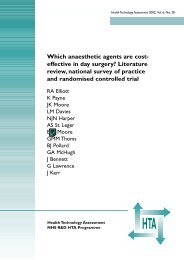A systematic review and economic model of the effectiveness and ...
A systematic review and economic model of the effectiveness and ...
A systematic review and economic model of the effectiveness and ...
Create successful ePaper yourself
Turn your PDF publications into a flip-book with our unique Google optimized e-Paper software.
74<br />
Clinical <strong>effectiveness</strong><br />
Results <strong>of</strong> <strong>the</strong> MTA trial<br />
The MTA trial was designed to answer three<br />
questions: 76<br />
1. Do medication <strong>and</strong> behavioural treatments result in<br />
comparable levels <strong>of</strong> improvement in pertinent<br />
outcomes at <strong>the</strong> end <strong>of</strong> treatment?<br />
Medication management was superior to<br />
behavioural treatment for three (<strong>of</strong> five)<br />
measures <strong>of</strong> ADHD core symptoms. No<br />
significant differences were observed across <strong>the</strong><br />
o<strong>the</strong>r key dimensions.<br />
2. Do participants assigned to combined treatment show<br />
higher levels <strong>of</strong> improvement in overall functioning<br />
in pertinent outcome domains than those assigned to<br />
ei<strong>the</strong>r medication management or behavioural<br />
treatment at <strong>the</strong> end <strong>of</strong> treatment (one-tailed<br />
hypo<strong>the</strong>ses)?<br />
(a) Combined treatment <strong>and</strong> medication<br />
management do not differ significantly<br />
across any domain.<br />
(b) Combined treatment was superior to<br />
behavioural management on three (<strong>of</strong> five)<br />
measures <strong>of</strong> ADHD core symptoms, for one<br />
(<strong>of</strong> three) measures <strong>of</strong><br />
aggression/oppositional behaviour, for one<br />
(<strong>of</strong> three) measure <strong>of</strong> anxiety depression<br />
<strong>and</strong> for one (<strong>of</strong> three) measure <strong>of</strong> academic<br />
achievement. No significant differences<br />
were observed in social skills or<br />
parent–child relations.<br />
3. Do participants assigned to each <strong>of</strong> <strong>the</strong> three MTA<br />
treatments (medication management, behavioural<br />
treatment <strong>and</strong> combined treatment) show greater<br />
improvement over 14 months than those assigned to<br />
community care (one-tailed)?<br />
(a) Medication management was superior to<br />
community care for three (<strong>of</strong> five) measures<br />
<strong>of</strong> ADHD symptoms, for two (<strong>of</strong> three)<br />
measures <strong>of</strong> aggression/oppositional<br />
behaviour <strong>and</strong> for one (<strong>of</strong> two) measures <strong>of</strong><br />
social skills. No significant differences were<br />
observed in anxiety/depression or<br />
parent–child relations.<br />
(b) No significant differences between<br />
behavioural management <strong>and</strong> community<br />
care were observed for any outcome<br />
domains.<br />
(c) Combined treatment was superior to<br />
community care for four (<strong>of</strong> five) measures<br />
<strong>of</strong> ADHD symptoms, for two (<strong>of</strong> three)<br />
measures <strong>of</strong> aggression/oppositional<br />
behaviour, for one (<strong>of</strong> three) measures <strong>of</strong><br />
anxiety/depression, for both measures <strong>of</strong><br />
social skills, for one (<strong>of</strong> two) measures <strong>of</strong><br />
parent–child relations <strong>and</strong> for one (<strong>of</strong> three)<br />
measures <strong>of</strong> academic achievement.<br />
The MTA Cooperative Group conducted fur<strong>the</strong>r<br />
analysis to identify patient subgroups with better<br />
or worse response to <strong>the</strong> various treatment<br />
strategies. 105 This analysis should be seen as<br />
exploratory, because <strong>of</strong> <strong>the</strong> danger <strong>of</strong> repeated<br />
statistical testing with a sample not designed for<br />
this purpose. There was no difference in treatment<br />
response by sex, prior treatment or presence <strong>of</strong> comorbid<br />
disruptive disorders. Behavioural<br />
treatment appeared to be more effective in<br />
children with anxiety disorders <strong>and</strong> children from<br />
deprived backgrounds.<br />
Since <strong>the</strong> publication <strong>of</strong> <strong>the</strong> previous NICE<br />
report, 4 <strong>the</strong> authors <strong>of</strong> <strong>the</strong> MTA trial have<br />
published a number <strong>of</strong> related papers. 106–113 Most<br />
<strong>of</strong> <strong>the</strong>se are cross-sectional analyses, overview<br />
studies or studies focusing on covariates, such as<br />
socio-<strong>economic</strong> status or ethnicity, which will not<br />
be discussed in this report. 106,107,110,111<br />
O<strong>the</strong>r papers focused on subgroup<br />
analyses. 108,109,112 As <strong>the</strong> samples were not designed<br />
for this purpose, results should be interpreted with<br />
caution. Vitiello <strong>and</strong> colleagues examined <strong>the</strong><br />
trajectory <strong>of</strong> MPH dosage over time, following a<br />
controlled titration. 108 The aim was to ascertain<br />
how accurately <strong>the</strong> titration was able to predict<br />
effective long-term treatment in children with<br />
ADHD. They concluded that for most children,<br />
initial titration found a dose <strong>of</strong> MPH in <strong>the</strong> general<br />
range <strong>of</strong> <strong>the</strong> effective maintenance dose, but did<br />
not prevent <strong>the</strong> need for subsequent maintenance<br />
adjustments. 108 Greenhill <strong>and</strong> colleagues 109<br />
examined whe<strong>the</strong>r <strong>the</strong> trial identified <strong>the</strong> best MPH<br />
dose for each child with ADHD. They found that<br />
<strong>the</strong> MTA titration protocol validated <strong>the</strong> efficacy <strong>of</strong><br />
weekend MPH dosing <strong>and</strong> established a total daily<br />
dose limit <strong>of</strong> 35 mg <strong>of</strong> MPH for children weighing<br />



